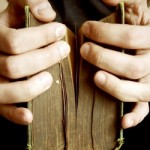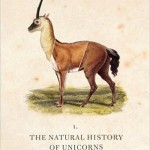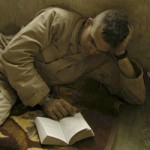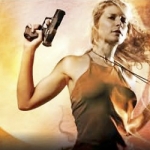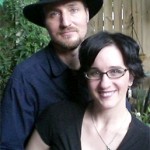Tobias Hill is the author of a tale set in modern day Sparta where terror never died. The Hidden is a gripping tale of suspense and obsession and will be sure to have your attention from the very beginning. As it gains momentum, if you’re anything like me, you won’t be able to read fast enough. The Hidden made it to the number 2 spot on the recent Best Books of 2009 list for a good reason: you’ll be thinking about it long after you’ve finished reading. I had the opportunity of asking Mr. Hill a few questions about himself and his work.
Kelly Melcher: Would you first start by introducing yourself and giving us some of your background as a writer?
Tobias Hill: If you like. My name is Tobias (a fresh-faced boy in the Apocrypha, who travels with angels and wrestles with fish) Fleet (a long-buried river in North London, and a great uncle who died in the Great War) Ahasuerus (more Apocrypha) Hill (like Benny).
I come to the novel from poetry. It’s not a one-way ticket; I still write poetry, and always will. But I like stories, and I enjoy the depths that can be reached in a piece of work as large as a novel. The heights too.
KM: You write both poetry and prose; is it difficult to transition between the two? In your opinion does one make you better at the other?
TH: I write poetry, short stories, and novels, and there are transitions between all three. The poem and the short story are akin; they share all kinds of characteristics. The novel is different. It’s another continent for me. I’m still finding my feet there.
Does writing poetry improve novel writing? It can. In poetry every word counts, and every part of every word: there are no weaknesses in a good poem. Look at Frost. Those who dislike poetry sometimes imagine it to be a gentle art. It’s not. If there is gentleness in a poem, it exists because of the poet’s rigour and focus. Once a writer has applied those qualities to writing…yes, I think they can be useful if the writer then turns to the novel.
KM: The terror aspect of the story seemed to come on the back end; until it was put forward blatantly, the story seemed to be going in a different direction. In your mind, what is the prevailing theme in The Hidden?
TH: Here’s my dream, as a writer: that someone loves The Hidden, reads it now, and then goes back and reads it again in a year or two. If you read it a second time, you’ll find that terror is there from the outset. Ben doesn’t know it, of course, and because the reader is kept very close to Ben, the reader may not realise it consciously the first time through; but terror runs through the whole novel. That’s the theme of it.
KM: Obsession seems to be another theme you visit quite often; will it continue to be a theme in future works?
TH: I don’t ever set out to write about obsession, and it must say something about me that I seem to return to it so often. If it does say something (and I suppose it must) then there’s no point my trying to avoid it in the future.
I do find obsession interesting, though. Can it be rational? Can it be worthwhile? Is it ever really explicable?
KM: How much and what kind of research did you do before writing The Hidden?
TH: A year’s research, more or less… well, more, because unexpected things always come up during the writing itself. I don’t think The Hidden should be read as if it’s factually accurate, though. It’s a novel: if it’s true at all, it’s because it’s fiction, not despite it.
KM: Did your idea for the story change at all from when you began writing to when you finished the last draft?
TH: Blimey, yes. The Hidden began life as a novel about secrets, using the excavation of ancient Sparta as an over-arching setting and metaphor. I began planning that book ten years ago. Long before I began writing it, though, the world changed. What Sparta meant in a novel planned before 9/11 isn’t the same as what it could mean in one written afterwards. Sparta survived for centuries through the careful application of terror; writing about it over the last five years, it was impossible not to write about the changes that have taken place in contemporary societies in the last decade.
KM: What fascinated you the most about Ancient Greece and Sparta in particular?
TH: Greece I find fascinating in any case. If you’ve been you’ll know what I mean. The Greek landscapes are extremely beautiful. They’re very pure, very simple; but dig a little deeper, and culturally and historically, Greece isn’t like that at all. It’s absolutely the opposite.
Sparta is a special case. In America, as in Europe, our great Greek inheritance is Athenian… or so we like to think. The heirlooms of Athens are democracy, capitalism, art and science, and benign imperialism (or so the various imperialists would have it); we might not admire all those things, but we’d be hard-pressed to deny their presence in Western cultures, and we celebrate Athens (and its spiritual successor, Rome) in our architecture and institutions.
Sparta is different. Sparta gives us terror. No art, no science, no writings. Sparta tries hard to hide what it gives us, but we can’t ignore it, because it has given us a great deal. Its history foreshadows Nazism, Stalinism and religious extremism. It is obsession personified in a single culture. It casts a darker shadow, one that reaches into our contemporary cultures just as that of Athens does, but Sparta’s influence isn’t something we make much reference to, or sometimes are even aware of. That I find interesting.
KM: There seems to be some heavy symbolism throughout, including the broken and discarded bodies found by the excavation (which seemed to me like a reflection of their inner selves). How much of that was intentional, and how much of that is left up to the reader’s interpretation?
TH: I believe the book ends with the reader. The reader completes it. I plan quite intensively, for a writer, but if I planned everything, and revealed everything, what would I leave for the reader to do? I respect my readers, and I trust them to come to their own conclusions.
KM: The Hidden is very much about secrecy and isolation, yet I have read that your next book is about collisions. Was this a conscious choice and, more specifically, what can you tell us about future works?
TH: It wasn’t a conscious decision, no, and I try not to analyse myself too much as a writer — that kind of self-consciousness (navel-gazing?) can be bad news for artists. The next novel takes a line from Emerson — ‘Cities give us collisions’ — and runs with it. I’ve a lot of admiration for those preacher-writers, Emerson and his predecessors. The sermon was a work of art, then — though I’m glad we’ve got his poetry, too.
KM: At Fandomania we like to ask: What are you a fan of?
TH: Fun question. Well, let’s see: in these 10 questions I’ve admitted to fandom of Ralph Waldo E, Greece, obsession, trustworthy readers, and Robert Frost. I also love Japan, Arsenal Football Club, my wife (this is in no particular order, alright?), and building good fires when it’s snowing outside… which is it now. I should get back to that fire. Thanks and best, TH.
I would like to thank Tobias Hill on behalf of myself and my associates at Fandomania for taking the time to answer my questions!


